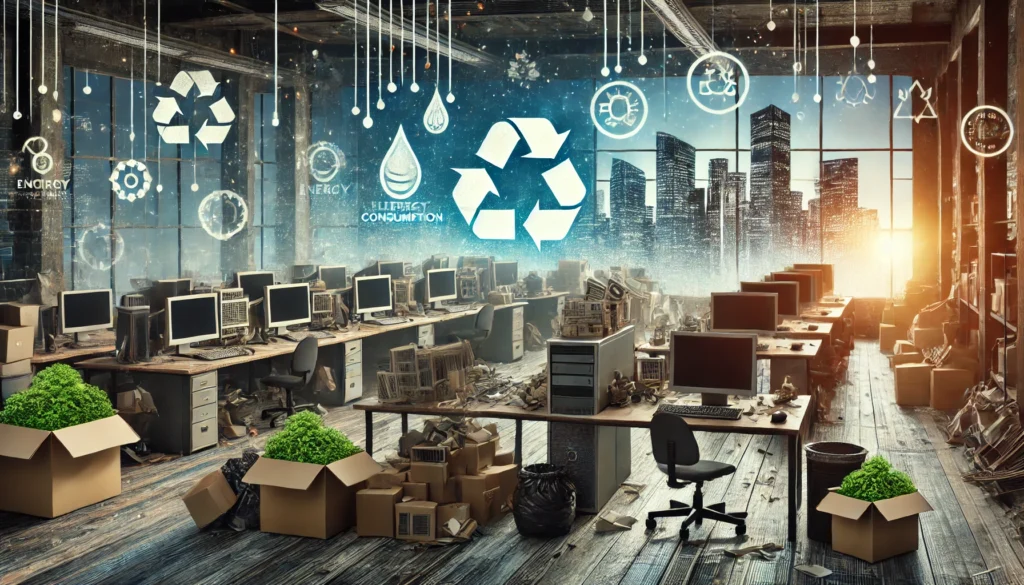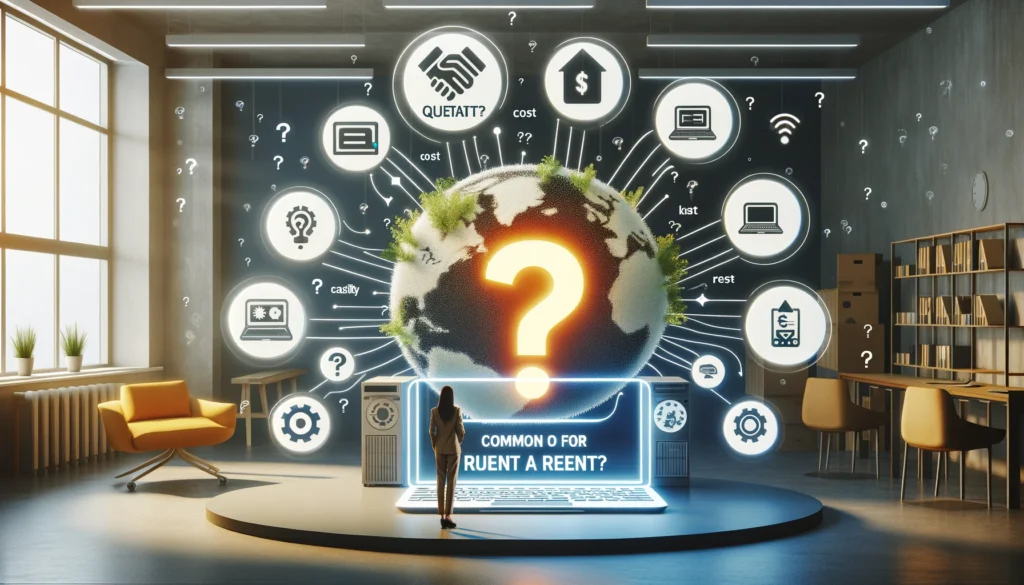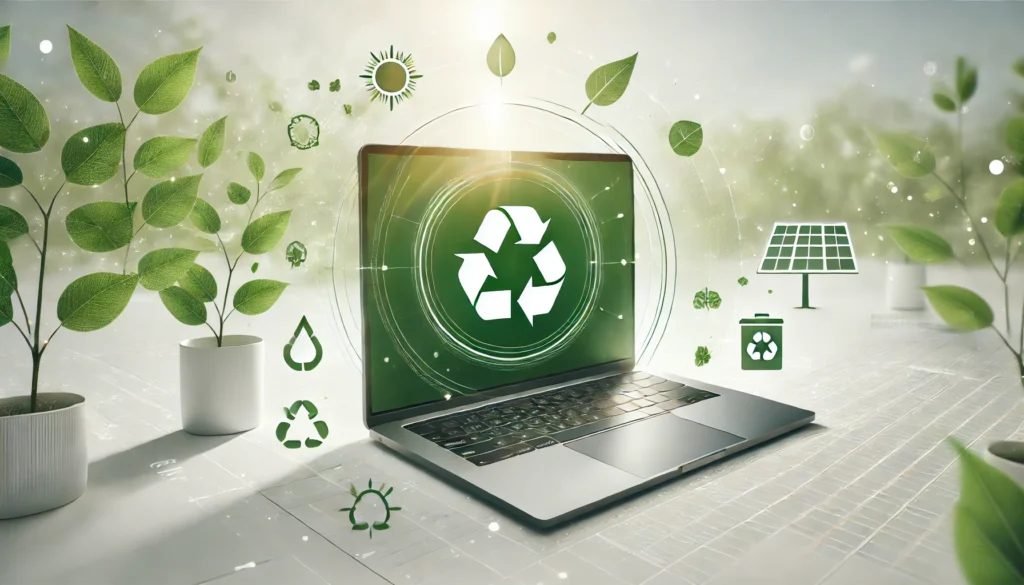Every year, millions of tons of electronic waste (e-waste) end up in landfills, releasing toxic chemicals into the environment. The electronics industry relies heavily on precious metals, raw materials, and energy-intensive components like hard drives. Manufacturing new electronic devices requires an enormous amount of energy, contributing to carbon emissions and accelerating climate change.
Yet, despite these environmental concerns, businesses and individuals continue to upgrade to the latest models, leaving older devices to pile up as waste. This throwaway culture not only wastes valuable resources, but also increases the demand for new devices, worsening the carbon footprint of the electronics industry.
What if there was a better way? Computer rentals offer a sustainable alternative, ensuring that electronic devices stay in use longer, reducing e-waste and lowering demand for manufacturing. By choosing to rent instead of buy, you’re taking a step toward a greener future—one where technology is used efficiently without harming the planet.
Now that we understand the problem, let’s explore how computer rentals fit into the sustainable computing movement.
The Environmental Impact of Traditional Computer Ownership
The Growing E-Waste Crisis

The world produces an estimated 62 million metric tons of e-waste every year, and this number is rapidly increasing. Outdated electronic devices often end up in landfills, where toxic chemicals like lead, mercury, and cadmium seep into the soil and water. Without proper e-waste recycling, this pollution poses serious risks to both human health and the environment.
High Energy Consumption & Carbon Footprint
Manufacturing new devices requires large amounts of energy, significantly contributing to carbon emissions. Every time a company or individual upgrades to a newer model, the demand for raw materials increases, leading to more mining, energy consumption, and deforestation. This cycle worsens our ecological footprint, making reducing carbon emissions more difficult.
The Short Device Lifespan Problem
Technology evolves quickly, and most older models are discarded within just a few years of use. The electronics industry encourages frequent upgrades, creating a culture where functional devices are replaced prematurely. Instead of recycling e-waste or refurbishing existing equipment, many businesses simply dispose of electronics, leading to unnecessary waste.
With these environmental issues in mind, let’s examine how computer rentals offer a sustainable solution.
Sustainable Computing: Why Computer Rentals Are an Eco-Friendly Solution
The electronics industry is one of the biggest contributors to e-waste, with businesses frequently upgrading to the latest models and discarding older devices. This creates a cycle of high energy consumption, increased waste, and greater environmental impact.
Computer rentals offer a sustainable alternative by extending the life of devices and reducing carbon emissions from excessive manufacturing. Instead of letting electronics sit unused or disposing of them improperly, renting ensures that devices remain functional for longer, leading to fewer materials wasted and less strain on the planet.
How Computer Rentals Support a Circular Economy
- Reusing Instead of Disposing: Instead of discarding older models, rental companies refurbish, upgrade, and reintroduce them to the market.
- Reducing E-Waste: Fewer discarded electronic devices means less toxic waste in landfills.
- Minimizing Demand for New Manufacturing: Fewer new devices need to be produced, reducing energy consumption and carbon emissions.
By choosing rentals, you’re not just making a cost-effective decision, you’re making an eco-friendly choice that benefits everyone.
Key Environmental Benefits of Computer Rentals
The world’s growing reliance on technology has intensified the e-waste crisis, with millions of electronic devices discarded each year. Improper disposal not only harms the environment, but also wastes valuable materials that could be repurposed. By choosing computer rentals, businesses and individuals can help reduce e-waste and lower their carbon footprint while still having access to the latest technology.
Reducing E-Waste and Electronic Waste Recycling
E-waste recycling is important to reducing the impact of discarded electronic devices. According to the Global E-Waste Monitor, only 17.4% of global e-waste is properly collected and recycled. Rental companies extend the lifespan of computers by refurbishing and reusing devices that would otherwise be disposed of. This reduces e-waste, keeps precious metals and hard drives in circulation, and minimizes the environmental impact of manufacturing new electronics.
Lowering Carbon Emissions and Energy Consumption
Every new device manufactured requires raw materials such as metals, plastic, and glass, and the production process consumes significant amounts of energy. Research from the UN Environment Programme highlights that 80% of a computer’s carbon footprint is generated before it even reaches the user. By renting computers, businesses can cut down on energy consumption, reduce carbon emissions, and decrease the carbon impact of their operations.
Supporting a Circular Economy and Sustainable Alternatives
A circular economy model focuses on reusing, repairing, and recycling rather than discarding electronics. The European Environment Agency (EEA) explains how a circular economy for electronics can drastically reduce waste and protect natural resources. Computer rentals fit perfectly into this system by keeping devices in use for longer periods. This helps preserve natural resources, reduces the demand for new devices, and promotes sustainable alternatives that benefit both consumers and the environment.
Addressing Reader Concerns: Common Questions About Renting Computers

Some businesses and individuals may wonder whether renting computers is truly a sustainable alternative. Here are some common concerns and how rentals provide eco-friendly solutions:
“Is renting more sustainable than buying?”
Yes! Renting reduces production demand and helps extend the life of electronic devices. Instead of disposing of older models, rental companies refurbish and upgrade them, ensuring they stay in use for as long as possible. The U.S. Environmental Protection Agency (EPA) supports the reuse of electronics as a way to reduce e-waste.
“What happens to rented computers after use?”
Most rental companies follow proper disposal and recycling practices, ensuring that old devices are either refurbished or sent for e-waste recycling rather than ending up in landfills. The Basel Action Network (BAN) advocates for responsible e-waste disposal, ensuring that discarded devices are not illegally dumped in developing countries.
“Is renting cost-effective?”
Renting allows businesses to avoid the high upfront costs of purchasing new devices while also reducing e-waste. Companies only pay for what they need, making rentals both an eco-friendly and budget-friendly solution. A study by Tech Republic shows that renting can save businesses up to 30% compared to purchasing new equipment outright.
“How do I ensure quality and reliability?”
Reputable rental providers offer high-quality, energy-efficient models that are well-maintained. Look for companies that provide warranty coverage and tech support to ensure the best experience. The Energy Star program offers guidelines on choosing energy-efficient computers, helping users select models that minimize power consumption while maximizing performance.
How to Choose a Sustainable Computer Rental Service
To maximize the environmental benefits of computer rentals, it’s important to select a sustainable provider that follows eco-friendly practices.
Here are some key factors to consider:
Look for Certified Green Practices
Choose rental providers that are committed to responsible e-waste disposal and participate in certified recycling programs. Organizations like TCO Certified offer certifications for sustainable IT equipment, ensuring that the devices meet strict environmental and social criteria.
Check Device Refurbishment and Recycling Policies
Ensure the rental company actively refurbishes, upgrades, and recycles their older models instead of discarding them. Green Electronics Council provides recommendations on eco-friendly IT practices, which include extending the lifespan of electronic devices through refurbishment programs.
Opt for Energy-Efficient and Sustainable Models
Modern computers come with energy-saving features that lower power consumption while maintaining performance. The International Energy Agency (IEA) highlights the importance of energy efficiency in reducing carbon emissions. Renting from a provider that prioritizes energy-efficient devices will help you reduce carbon emissions and support a sustainable future.
The Future of Sustainable Computing: A Shift Towards Greener Technology

As technology advances, the electronics industry faces growing pressure to adopt sustainable alternatives. Governments, businesses, and consumers are realizing the need to reduce e-waste, lower carbon emissions, and embrace energy-efficient solutions. The transition to sustainable computing is not just a trend—it’s a necessity.
Growing Awareness and Corporate Responsibility
Large corporations and governments worldwide are setting ambitious sustainability goals to combat the environmental impact of electronic waste. Tech giants like Dell, HP, and Apple have pledged to use more recycled materials and extend the lifespan of their electronic devices. The United Nations E-Waste Coalition is also working to improve e-waste recycling efforts on a global scale.
Advancements in Energy-Efficient Hardware
Tech manufacturers are designing energy-efficient computers that consume less power, reducing their carbon impact. Programs like Energy Star certify devices that meet high energy efficiency standards. By renting computers, businesses and individuals can ensure they are using the latest models that minimize energy consumption while maximizing performance.
Stronger Policies on E-Waste Management
Governments are implementing stricter regulations on proper disposal of electronic waste, encouraging businesses to participate in circular economy initiatives. The European Union’s Right to Repair legislation is an example of how policies are shifting toward sustainability, requiring manufacturers to produce repairable and longer-lasting devices.
Making a Conscious Choice for a Greener Future
The way we use technology has a direct impact on the environment, and choosing sustainable alternatives like computer rentals can make a real difference. Instead of contributing to e-waste and carbon emissions, renting allows you to reduce your ecological footprint while still accessing top-tier technology when needed.
Every rented computer means one less electronic device in a landfill and fewer raw materials extracted from the planet. By making smarter choices, businesses and individuals can lead the way toward a greener future.
If you’re looking for a trusted rental provider that values sustainability, check out A Vintage Affair Rentals. Their commitment to eco-friendly solutions and high-quality rental services helps businesses and individuals make greener choices without compromising on performance or reliability. Visit their website today and explore how renting technology can contribute to a more sustainable future.
The future of technology is sustainable, and it starts with the choices we make today. Will you be part of the change?